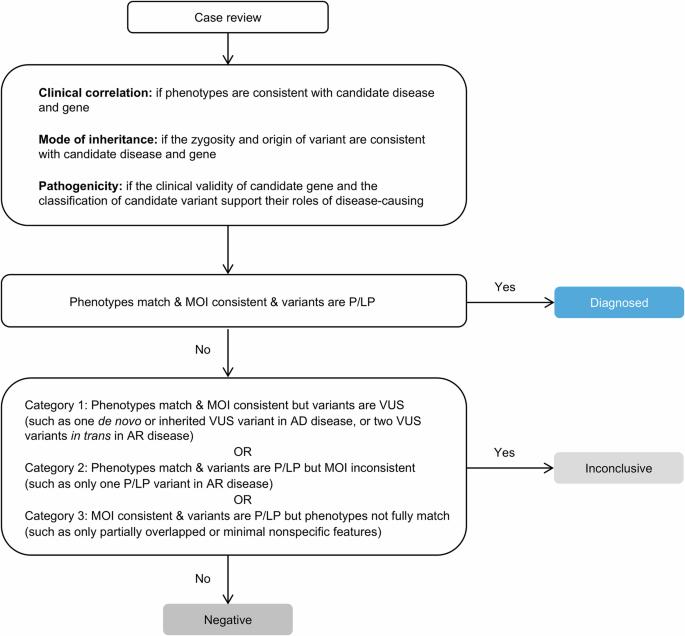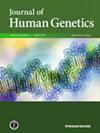Diagnostic yield of trio exome sequencing as a first-tier test for identifying genetic causes of pregnancy loss
IF 2.5
3区 生物学
Q2 GENETICS & HEREDITY
引用次数: 0
Abstract
Genetic defects are a major cause of pregnancy loss, leading to fetal death or elective abortion due to congenital anomalies. This study evaluates the effectiveness of trio exome sequencing (ES) in identifying genetic causes of pregnancy loss. Trio ES was used as a first-tier genetic test on 193 cases of pregnancy loss to detect both chromosomal abnormalities and small variants potentially linked to fetal death and anomalies. The pathogenicity of identified variants was assessed, and the diagnostic yield was analyzed. Trio ES provided an overall diagnostic yield of 24% (47/193) across this cohort, with a similar positive rate observed in fetal death (26%, 12/45) and elective abortion (23%, 35/148) groups. Among diagnosed cases, 45% (21/47) were attributed to chromosomal abnormalities, while 55% (26/47) were caused by small variants. This suggests that ES more than doubled the positive rates compared to traditional methods such as karyotyping and chromosomal microarray analysis. Notably, chromosomal abnormalities were the primary cause of fetal death (75%, 9/12), whereas small variants were more prevalent in elective abortion cases (68%, 24/35), particularly those with central nervous and skeletal anomalies. Additional candidate variants were identified in 35 inconclusive cases (18%), potentially further increasing the detection rate. This study highlights the value of trio ES in diagnosing genetic causes of pregnancy loss. Implementing it as a first-tier test can significantly enhance our understanding of fetal death and anomalies, therefore facilitating informed future pregnancy management.

三重奏外显子组测序的诊断产量作为鉴定遗传原因流产的一级测试。
遗传缺陷是流产的主要原因,导致胎儿死亡或因先天性异常而选择性流产。本研究评估了三外显子组测序(ES)在确定流产遗传原因方面的有效性。在193例妊娠丢失病例中,Trio ES被用作一级基因检测,以检测染色体异常和可能与胎儿死亡和异常相关的小变异。评估鉴定变异的致病性,并分析诊断率。在该队列中,Trio ES的总诊断率为24%(47/193),在胎儿死亡组(26%,12/45)和选择性流产组(23%,35/148)中观察到类似的阳性率。在确诊病例中,45%(21/47)归因于染色体异常,55%(26/47)归因于小变异。这表明,与传统方法(如核型分析和染色体微阵列分析)相比,ES的阳性率增加了一倍以上。值得注意的是,染色体异常是胎儿死亡的主要原因(75%,9/12),而小变异在选择性流产病例中更为普遍(68%,24/35),特别是那些有中枢神经和骨骼异常的病例。在35例不确定病例(18%)中发现了其他候选变异,可能进一步提高了检出率。本研究强调了三重ES在诊断流产遗传原因中的价值。将其作为一级检测,可以显著提高我们对胎儿死亡和异常的了解,从而促进知情的未来妊娠管理。
本文章由计算机程序翻译,如有差异,请以英文原文为准。
求助全文
约1分钟内获得全文
求助全文
来源期刊

Journal of Human Genetics
生物-遗传学
CiteScore
7.20
自引率
0.00%
发文量
101
审稿时长
4-8 weeks
期刊介绍:
The Journal of Human Genetics is an international journal publishing articles on human genetics, including medical genetics and human genome analysis. It covers all aspects of human genetics, including molecular genetics, clinical genetics, behavioral genetics, immunogenetics, pharmacogenomics, population genetics, functional genomics, epigenetics, genetic counseling and gene therapy.
Articles on the following areas are especially welcome: genetic factors of monogenic and complex disorders, genome-wide association studies, genetic epidemiology, cancer genetics, personal genomics, genotype-phenotype relationships and genome diversity.
 求助内容:
求助内容: 应助结果提醒方式:
应助结果提醒方式:


